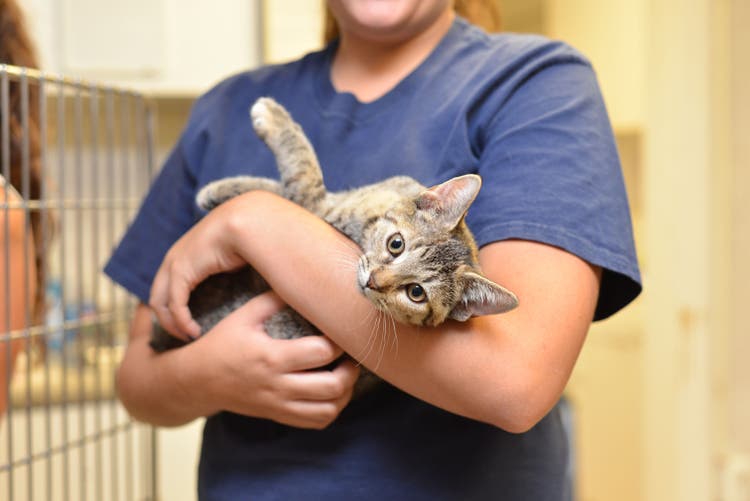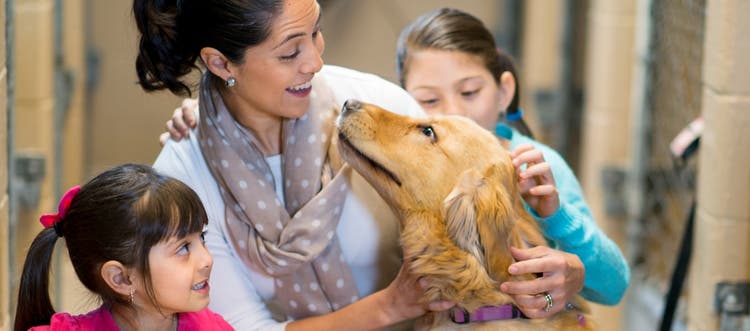What to know about rescuing a pet.
Could rescuing a kitten or puppy be right for you? Learn what you need to know with this list of commonly asked questions and answers about adopting from rescues and shelters.
Why Should I Rescue a Puppy or Kitten?
Adopting a puppy or kitten from a shelter or animal rescue instead of buying from a breeder is a fantastic choice for several reasons:
- You’re providing a home for a homeless animal.
- Adoption frees up space in the shelter or rescue to help more animals in need.
- Rescues and shelters take special care to match the right pet to the right home.
- The cost to adopt is typically cheaper than purchasing a pet from a breeder — plus the money goes to supporting the shelter or rescue and helping other cats and dogs.
Should I Be Concerned about a Rescue Animal’s Health?
As well as feeding and housing adoptable pets, animal rescues and shelters give kittens and puppies a full health check, routinely treat them for parasites such as fleas, ticks and worms, and give them their first vaccinations.
Most animals in rescues will be spayed or neutered if they’re old enough, or the shelter will often require fixing as a condition of adoption. They will also alert you to any current or past health issues, and may not allow a puppy or kitten to be adopted if they’re in poor health.
When Can I Take a Kitten or Puppy Home from a Rescue?
Kittens and puppies can usually be taken home when they are 12 weeks old, but the exact age may vary slightly depending on the organization. Ideally, the kitten or puppy should be with their mother until they reach this age.
Remember: It may be possible to adopt the mother along with the kitten or puppy. An adult cat or dog is likely to be calmer than a kitten or puppy and may make a great addition to your home.
How Can I Find the Right Pet for My Family and Lifestyle?
Every rescue or shelter wants a happy outcome for all its animals, and the key is finding the right pet for the right home. The staff will help match you with the right kitten or puppy.
You can view the available animals at most rescues and shelters in online galleries on their websites. Additionally, many offer a consultation service with their experts to find the right match for you.
The rescue or shelter will ask you questions about your house, family lifestyle and what you’re looking for to make the best fit. All family members may be asked to visit the puppies and kittens at the rescue to ensure the chemistry is right.
If I Have Young Children, Can I Still Adopt a Puppy or Kitten?
Young dogs and cats have bones that are still forming, making them vulnerable to playful hands or overzealous squeezes. As a result, some rescues and shelters have rules against puppies or kittens going home with families with toddlers or infants.
However, most are happy to place puppies or kittens into families with young children, although they may ask that all family members visit the shelter to meet their potential pet first. As a general rule, it’s a good idea to supervise babies and toddlers at all times near dogs or cats of any age.
What Are My Options Outside of Animal Rescues and Shelters?
Of course, there are other options available for getting a kitten or puppy beyond a rescue or shelter, and the decision is a personal one. For example, reputable, licensed breeders are always an option for getting a new pet.
Kittens and puppies may also become available from friends or neighbors when they have an unwanted litter. In this case, remember not to take the kitten or puppy away from their mother too early (typically not before 12 weeks). You will also need to contact a veterinarian to schedule their first visit for a general health screening, vaccinations, parasite prevention and, when your kitten or puppy is old enough, spaying or neutering.
Regardless of how they come into your home, a kitten or puppy is an energetic, loving addition to your household — whether they’re your first cat or dog, or your newest pet. By adopting your new pet, you’re improving both their life and yours.
Related Articles

Puppy Parenting: Our Downloadable Guide
New puppy? Whether this is your first go-round or your fifth, we know that so much goes in to raising healthy, happy pups. Check out our free guide, also available to download!

New Cat or Kitten: Our Downloadable Guide
Thinking about adding a feline to the family? There are so many emotional, social and physical benefits to owning a cat. Check out our free guide, also available to download!




